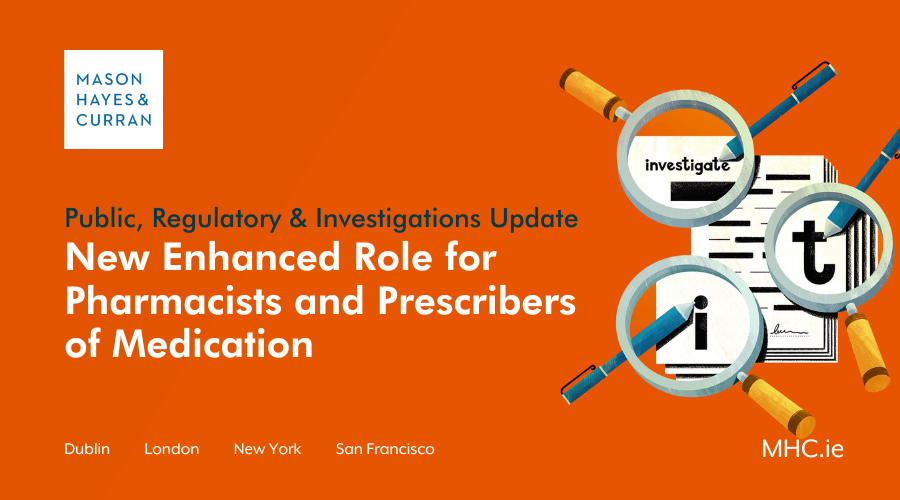New Enhanced Role for Pharmacists and Prescribers of Medication

The first of a series of recommendations allowing for the changing role of community pharmacists were implemented on 1 March 2024. Our Public, Regulatory and Investigations team looks at the impact of this change for regulated professionals.
New regulations have come into force to enhance the role of pharmacists in the delivery of community healthcare. Under the new measures, pharmacists are now able to extend the validity of certain prescriptions to a 12-month maximum. The regulations also permit doctors and other prescribers, such as nurses and dentists, to write prescriptions for up to 12 months where it is clinically appropriate.
The measures allow prescriptions to be written by the prescriber, including doctors, dentists, and nurse prescribers, where appropriate for a period of up to 12 months. Where the prescription provided is for more than six but less than 12 months, a patient can ask their pharmacist to consider extending it up to that limit from 1 September 2024 where it is issued on or after 1 March 2024.
When this is requested, the pharmacist must carry out an assessment of the appropriateness of extending the prescription, whether the patient has an ongoing need for that medication, and if it is in their best interests. This can be in consultation with the prescriber, if they consider it necessary. These measures enhance the need for collaboration between the healthcare professions involved to discuss and collectively consider how best to manage the patient’s care. Prescribers can also indicate on prescriptions that an extension would not be in the best interests of the patient at the time the prescription issues.
This legislation builds on temporary measures introduced during the COVID-19 pandemic, which allowed pharmacists to extend certain prescriptions to up to nine months, where they considered it clinically appropriate. The aim at that time was to ensure patients had continued access to regular treatment and to ease the additional burden on prescribers and pharmacists for those requiring ongoing treatment. Where a valid prescription was in place, a pharmacist could take the decision to extend it where, in their professional and clinical judgement, the patient required ongoing treatment and it was safe and appropriate in all the circumstances.
Similarly, these new changes are aimed at ensuring that those on extended treatment have ongoing access to necessary medications, while also freeing up clinical time to assist those in need of additional support.
The measures do not apply to all medication. For instance, controlled drugs are not eligible for extension. However, many standard medications will be included. This is the first of what is expected will be a series of measures from an Expert Taskforce established to support the expansion of the role of pharmacists.
Conclusion
The extension should be welcomed by patients, and overburdened healthcare professionals. However, it imposes a separate burden on those professionals affected to ensure that they exercise their professional judgement appropriately. It is important for those healthcare professionals to consider issues such as:
- The necessity for ongoing treatment
- Patient safety
- The appropriateness of an extended prescription for the patient concerned, and
- The views of others involved in the patient’s care
The Pharmaceutical Society of Ireland, the pharmacy regulator, is developing updated guidelines to support pharmacists with this development. We expect that guidance documents will also issue from other regulatory bodies. Time should be taken to review the details of this guidance and to ensure compliance with it in both the interests of the patient, and the profession to work within their scope of practice.
For more information and expert advice, contact a member of our Public, Regulatory and Investigations team.
The content of this article is provided for information purposes only and does not constitute legal or other advice.
Share this:



